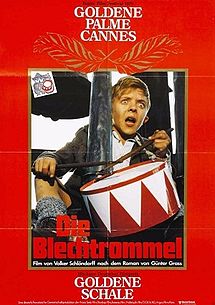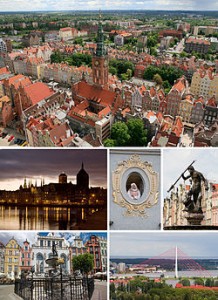 The Tin Drum was based on the full-length novel by the German author Günter Grass that was published in 1959, and director Volker Schlöndorff adapted it into a movie in 1979. It is said that the movie leaves out the second half of the original work, but the reproduction of the first half is fairly loyal to the original. Günter Grass received the Nobel Prize in Literature in 1999 for his achievements as an author, such as this book, while the movie won the Palme d’Or at the Cannes International Film Festival and the Academy Award for Best Foreign Language Film. Since I have not read the original, I wish to write only about the movie.
The Tin Drum was based on the full-length novel by the German author Günter Grass that was published in 1959, and director Volker Schlöndorff adapted it into a movie in 1979. It is said that the movie leaves out the second half of the original work, but the reproduction of the first half is fairly loyal to the original. Günter Grass received the Nobel Prize in Literature in 1999 for his achievements as an author, such as this book, while the movie won the Palme d’Or at the Cannes International Film Festival and the Academy Award for Best Foreign Language Film. Since I have not read the original, I wish to write only about the movie.
This movie is an unpleasant movie, like listening to a nail scratch on glass. The movie’s protagonist has for some reason stopped growing and is stuck in the body of a young child, but his mind and feelings are that of a grown adult. The catchphrase of this movie—“This movie is about the pacifism of the protagonist who stopped growing in order to oppose war”—is outrageous. To say it briefly, the protagonist of this story takes advantage of people thinking that he is a child due to his small body to do whatever he pleases, and instead of taking responsibility for his actions, he shamelessly avoids responsibility by pretending he is a child. Because of the peculiar state of the protagonist, he can easily sense when an adult lets their guard down around him or an adult’s cunning when they are trying to take advantage of him. Also, it feels like the protagonist is reflecting a part of the author Günter Grass.
Günter Grass—unlike Oskar, the protagonist of this movie/novel—is not a little person; however, like Oskar, Günter was born in the Free City of Danzig, a territory that has been fought over by Poland and Germany. Also like Oskar, Günter was born of a German, Nazi-supporting father and an oppressed minority, Kashubian mother. Oskar participates with fellow little people in a dwarf circus that entertains and is treated well by high-ranking Nazi officers; Günter Grass also actually enthusiastically took part in Nazi activity in his youth. It may be a part of his past that he does not want to talk about much publicly, but when Günter confessed it, readers around the world who had idealized Günter Grass—a Nobel Prize author and advocate for peace—were shocked.
Of course being a successful author does not equal being a perfect person, and a reader with this expectation would be being selfish. Since there were many youths who thought seriously about how to live and became captivated by communist thought as a way to change the ugly world, it is conceivable that there were also many good-intentioned people who joined the Nazis with the passion of idealism to make the world a better place. It may not be possible to judge past earnest decisions simply from a modern point of view. Because the movie ends abruptly in the middle of the novel, the audience is made to think, “I am unpleasantly dragged around to have it end here?” However, the original continues on after that, and it is said that it ends with the protagonist continuing to escape reality, but achieving some growth and looking back on the past. Compared to the movie, which ends at the height of his escapism, my guess is that the original has some depth that the movie does not when the protagonist looks back with a point of view different than his selfish and immature one.
This movie was made in the 1970s, which was a confusing time across the world. Although the Cold War was becoming more serious, the majority of people had started to become disillusioned with the notion that socialism was the only salvation to change the world. In addition to the antagonism between liberalism and socialism, there was a new antagonism sprouting between Christian and Islamic fundamentalist nations. It was a time when people were at a loss, which was very different than things starting in 1980, when America, Great Britain, and the Soviet Union chose pragmatic leaders—President Reagan, Prime Minister Thatcher, and General Secretary Gorbachev, respectively—to look for pragmatic solutions. Even Hollywood—which always chose to have pleasing happy endings—started to make movies that left the audience in desperation and provided no solutions or salvation, which the audience thought was profound and depicted reality; this movie was made during these times. Now, 40 years later, I wonder what viewers think when they watch this movie. It seems that the current audience desires more emotionally consoling movies, thoroughly entertaining movies, or informative movies that positively influence how viewers live. Due to the change in times, it is no longer easy to understand the enthusiastic response to this movie when it was released.
Danzig is a harbor city that faces the Baltic Sea, and is at the northeast edge of the Polish Corridor that divided Germany. Since ancient times, Germany and Poland fought to control the land in the Corridor, but due to Germany’s defeat in World War I, the area was separated from Germany and transferred to being under the control of the League of Nations. With the Treaty of Versailles, Danzig was incorporated as Polish tariff territory; though not physically neighboring Poland, the city developed strong ties with Poland. The Free City of Danzig’s railroad that connected it to Poland was controlled by Poland; there was a Polish naval port; and of the two post offices, one post office was the city’s while the other was Poland’s. Residents of this area were mostly Polish and German, while a small number were Kashubian and Jewish.
At first, Danzig was established with the objective to protect the interests of Poles and to extend the power of Poland; however, the influence of Germans and Nazis gradually strengthened, and after the Nazis won the election in 1933, anti-Jew and anti-Catholic laws (meant to target Poles and Kashubians) were passed. In 1939, the Nazi government in Danzig started to severely oppress Poles living in Danzig. Then on September 1, 1939, the German battleship SMS Schleswig-Holstein, which was anchored at Gdańsk Bay in Danzig, began a severe bombardment on Poland’s military base in Danzig without proclamation, and thus World War II began.
The Polish army resisted by using the Polish post office as their fort. The Polish post office was considered to be Polish territory, rather than within Danzig city limits, and there was a direct phone line to Poland. It is said that workers had received rifle training before the war started. Also, some say that Poland’s anti-Germany intelligence organization secretly operated there. Despite their hard-fought defense, the Polish civilian army in the post office could not compete with the offense of the German army, and in the end, they surrendered.
 In World War II, most non-Jewish Polish citizens in Danzig were killed by German paramilitary organizations such as the Selbstschutz (“self-protection”), while the Jewish citizens were targeted by the Holocaust and were sent to concentration camps. In March of 1945, Danzig was liberated by the Soviet Union Red Army. In this movie, the way Oskar’s Kashubian mother goes back and forth between her German husband and her Polish lover seems to symbolize the race conflict in Danzig. There is a strong possibility that Oskar’s real father is the Polish man, but because he is the child of a German on the family register, Oskar barely escapes alive to Germany after the war. However, his grandmother remains in Danzig, and she is separated from Oskar for the rest of her life; since his grandmother is Kashubian, she cannot enter Germany.
In World War II, most non-Jewish Polish citizens in Danzig were killed by German paramilitary organizations such as the Selbstschutz (“self-protection”), while the Jewish citizens were targeted by the Holocaust and were sent to concentration camps. In March of 1945, Danzig was liberated by the Soviet Union Red Army. In this movie, the way Oskar’s Kashubian mother goes back and forth between her German husband and her Polish lover seems to symbolize the race conflict in Danzig. There is a strong possibility that Oskar’s real father is the Polish man, but because he is the child of a German on the family register, Oskar barely escapes alive to Germany after the war. However, his grandmother remains in Danzig, and she is separated from Oskar for the rest of her life; since his grandmother is Kashubian, she cannot enter Germany.
Nowadays, Danzig is a Polish territory called Gdańsk. It was mostly destroyed in World War II, but it is said that due to the great efforts of current citizens, the historic streets have been rebuilt, and it prospers as a beautiful town for sightseeing.
